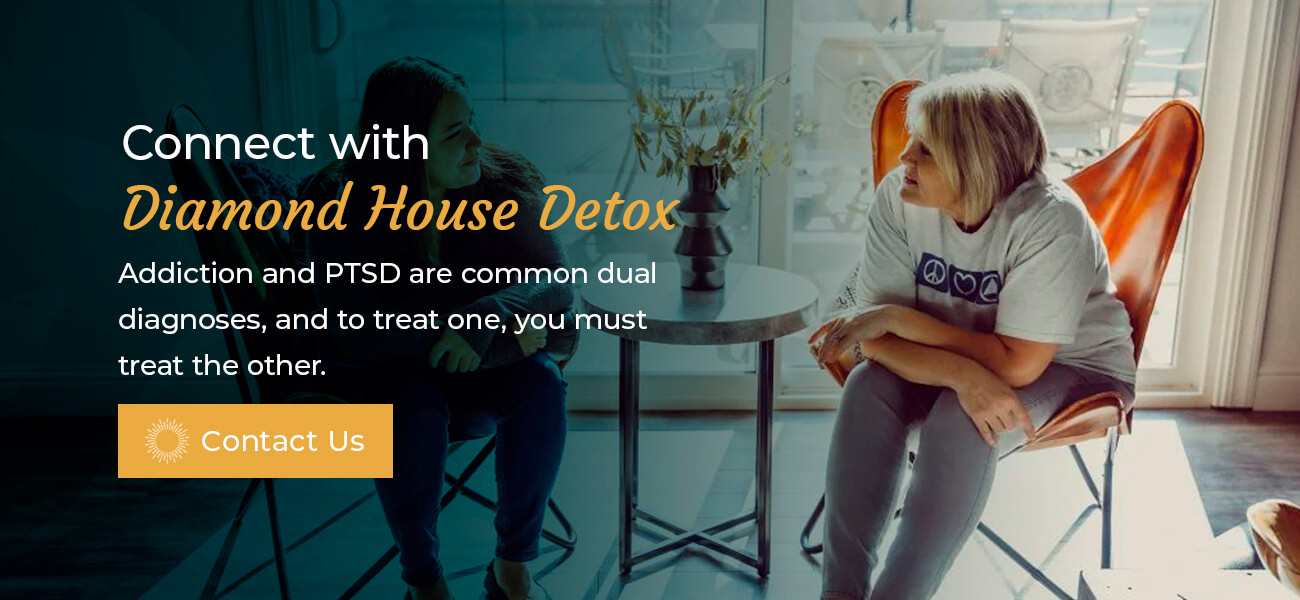Post-traumatic stress disorder (PTSD), like other mental health conditions, can significantly disrupt a person’s way of life. Symptoms of PTSD often develop after a person experiences, witnesses or learns about a traumatic event. These symptoms can be challenging to cope with, often impacting a person’s ability to function in daily life.
PTSD treatment centers recognize these difficulties and how the condition can be impacted by substance use disorder. That’s why we design our treatment programs at Diamond House to help anyone struggling with this type of dual diagnosis. If you or a loved one has PTSD, keep reading to learn more about the condition and how we can help.
PTSD is a mental health condition triggered by a traumatic event. Trauma can occur when you experience something shocking and feel your life is in danger — however, not everyone who experiences something traumatic will develop PTSD. PTSD symptoms include flashbacks, nightmares, anxiety and thoughts about the trauma you experienced or witnessed.
Approximately 6% of the U.S. population will experience trauma in their lifetime, and around 12 million people experience PTSD each year. War veterans, first responders and those with co-occurring mental health disorders are at an increased risk, as are people who experience several ACEs (Adverse Childhood Experiences). It’s also common for people lacking coping skills or a support system to experience PTSD after a traumatic event.
The following are examples of traumatic experiences where people might turn to PTSD treatment center for help:
While many veterans have PTSD, the condition can happen to anyone, with uncontrollable factors that may increase their risk. While coping with the fear and anxiety of traumatic events can be challenging, time and healthy coping skills can help. At treatment centers for PTSD, you can heal from trauma and achieve an overall healthier lifestyle.
Signs and symptoms of PTSD will vary depending on the person. If symptoms worsen over time or impact your daily life, you might want to look into getting a formal PTSD diagnosis. Here are common symptoms of the condition:
A person can also develop complex post-traumatic stress disorder (C-PTSD). This occurs when you experience repeated trauma over months or years, during which you feel trapped. Signs and symptoms of C-PTSD include those of PTSD and additional ones, like:
You are more likely to develop C-PTSD if you’ve experienced childhood trauma, like abuse or kidnapping. Victims of ongoing domestic abuse are also at an increased risk.
No C-PTSD case is the same, and treatment will depend on the disorder’s length, duration and severity. Complex PTSD treatment centers address each issue as unique and specific, presenting you with the best way to combat trauma in your own way.
The best PTSD treatment centers use personalized, holistic treatments to meet your specific needs. At Diamond House, our PTSD care center uses medication management and psychotherapy to address this dual diagnosis.
People with PTSD often turn to substances or alcohol to mask their symptoms and may present depressive symptoms when first entering treatment. Treating dual diagnoses involves thoroughly examining the root causes of your PTSD while providing evidence-based addiction treatment. When you opt for our services, we’ll help you discover your unique triggers and establish healthy coping skills. Our ultimate goal is to help you heal from trauma and improve your well-being.
Examples of services provided in PTSD treatment centers include:
Psychotherapy can help you process your trauma without reliving the emotional discomfort that occurred during the event. When you can separate the trauma from the negative emotions, you can live a life free of intrusive flashbacks, nightmares, anxiety or fear.
While you may want to support someone with PTSD, it can be challenging to know where to start. You want to show that you care about the person and support their recovery, but you’re unsure what to avoid or how to help them best. Thankfully, just making yourself available and lending an ear can make all the difference in their healing process.
Here are some ways to help a loved one find treatment:
The ultimate goal of PTSD treatment is to help clients heal from the trauma and achieve a better sense of well-being. You can support a loved one through this process by educating yourself, accepting them and helping them navigate triggers.

Addiction and PTSD are common dual diagnoses, and to treat one, you must treat the other. That’s why at Diamond House, we provide a dual diagnosis to help increase the effectiveness of treatment. Our individualized programs can help you overcome addiction with detox and evidence-based therapies like EMDR, CBT and trauma therapy.
At our PTSD treatment center, we can help you process and heal from trauma in a safe, welcoming space. Contact us today to learn more and take the first step toward healing.